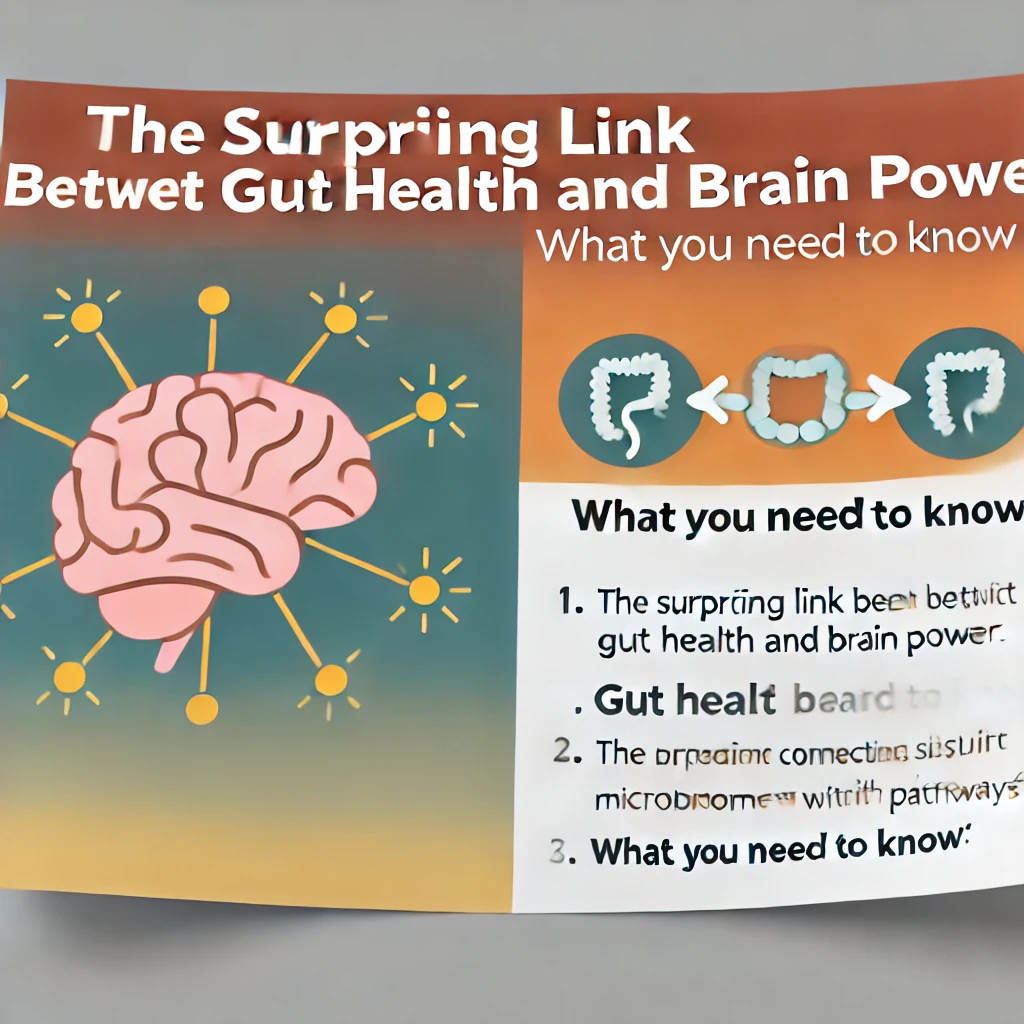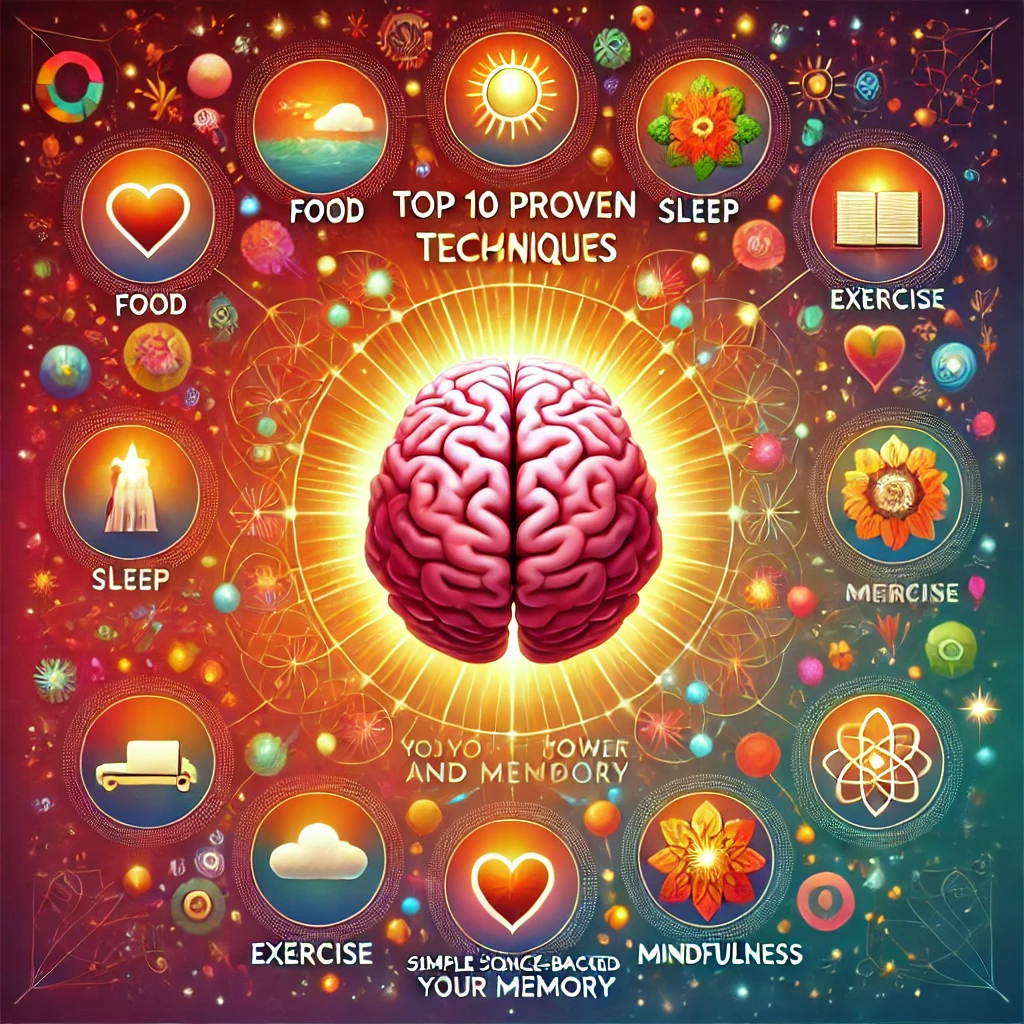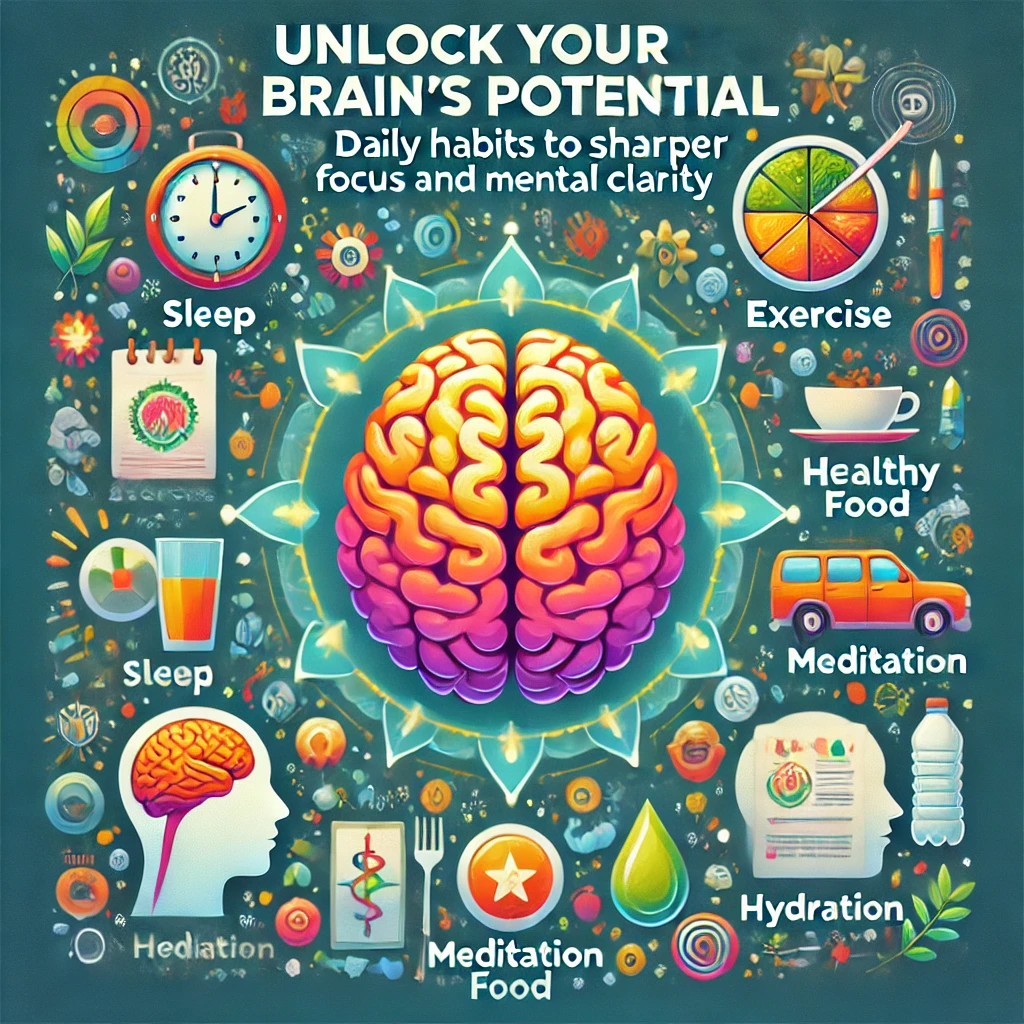Introduction
Have you ever wondered why a “gut feeling” can be so strong or why your stomach acts up when you’re stressed? It turns out that your gut and brain are more connected than we might think. New research on the “gut-brain axis” suggests that gut health plays a significant role in our cognitive function, mood, and overall brain power. Improving gut health can, in fact, boost brain function, enhance mental clarity, and even reduce stress.
In this article, we’ll explore the gut-brain health relationship, how gut health affects brain power, and practical tips to help you improve cognition through gut health. Let’s dive into this fascinating connection and uncover how taking care of your gut can lead to a healthier, sharper mind.
1. The Gut-Brain Axis Explained
To understand the connection between gut health and brain power, it’s important to grasp the concept of the gut-brain axis. The gut-brain axis refers to the two-way communication between our gut and brain. Think of it as a superhighway, where messages are constantly being sent back and forth.
How the gut-brain axis works:
- The Vagus Nerve: One of the longest nerves in our body, the vagus nerve connects the brain to various organs, including the gut. This nerve plays a major role in transmitting signals between the gut and brain.
- Gut Microbiome: The gut is home to trillions of bacteria, known as the gut microbiome. These bacteria influence brain function, mood, and mental health by producing neurotransmitters and interacting with the immune system.
- Hormones and Neurotransmitters: Certain hormones and neurotransmitters, like serotonin (often called the “happiness hormone”), are produced in the gut and can directly affect brain function.
Relatable anecdote:
I used to feel foggy and sluggish after certain meals, especially when I wasn’t mindful of what I ate. When I learned about the gut-brain axis, it made sense—my brain was reacting to what was happening in my gut. It was eye-opening to realize that what I was eating was impacting my focus and mood so directly.
2. How Gut Health Affects Brain Power
Our gut bacteria produce neurotransmitters and other chemicals that influence brain function. Poor gut health can disrupt this balance, leading to issues like brain fog, anxiety, and even memory problems. Here’s how gut health plays a role in brain power:
Key ways gut health impacts cognition:
- Mental Clarity and Focus: When gut bacteria are balanced, they support neurotransmitter production, which can help improve focus and mental clarity. Imbalances, however, can lead to brain fog and difficulties in concentrating.
- Mood and Emotional Resilience: An unhealthy gut can lead to decreased serotonin production, affecting mood regulation and increasing susceptibility to anxiety and depression.
- Memory and Learning: Studies suggest that gut health is linked to cognitive function, meaning a healthy gut can improve memory and learning capabilities.
Example:
A friend of mine who struggled with constant brain fog and fatigue discovered that her diet was playing a major role. After focusing on gut-friendly foods, she noticed a remarkable improvement in her mental clarity and energy levels, which allowed her to feel more alert and engaged.
3. Foods for Gut and Brain Health
The good news is that you can support your gut and brain health naturally through diet. Eating foods that promote a balanced gut microbiome can enhance mental clarity, focus, and overall brain function.
Top foods for a healthy gut-brain connection:
- Fermented Foods: Foods like yogurt, kefir, sauerkraut, and kimchi contain probiotics, which support healthy gut bacteria.
- High-Fiber Foods: Fiber acts as a prebiotic, feeding the beneficial bacteria in your gut. Great sources of fiber include fruits, vegetables, whole grains, and legumes.
- Omega-3 Rich Foods: Omega-3 fatty acids, found in fatty fish, walnuts, and flaxseeds, have anti-inflammatory properties that support both gut and brain health.
- Antioxidant-Rich Foods: Blueberries, dark chocolate, and leafy greens help reduce inflammation, benefiting the gut-brain axis.
- Polyphenols: Found in foods like green tea, olive oil, and berries, polyphenols support gut bacteria and have been shown to improve cognitive function.
Relatable anecdote:
When I started incorporating more fiber and fermented foods into my diet, I noticed a big difference in how I felt mentally. My mind felt clearer, and I had more consistent energy throughout the day, which helped me focus on work without needing constant coffee breaks.
Pro tip:
Try starting your day with a smoothie made from blueberries, spinach, and a spoonful of flaxseeds to get a healthy dose of fiber, antioxidants, and omega-3s, all of which support brain and gut health.
4. The Role of the Microbiome in Cognitive Function
Our gut microbiome plays a crucial role in cognitive function. Different types of bacteria in our gut have different effects on our mood, memory, and overall mental performance. Studies have shown that a diverse microbiome is linked to better cognitive performance and mental clarity.
Why gut microbiome diversity matters:
- Improves Stress Response: A balanced microbiome can help regulate cortisol, the stress hormone, promoting a calmer mind.
- Supports Neurotransmitter Production: Certain bacteria produce neurotransmitters like GABA and serotonin, which are essential for mood stability and focus.
- Reduces Inflammation: A diverse microbiome can prevent inflammation, which has been linked to cognitive decline and mood disorders.
Example:
I read about someone who began taking a high-quality probiotic and saw noticeable improvements in their mood and mental clarity. This improvement was likely due to the probiotic’s role in supporting the gut microbiome and enhancing neurotransmitter production, which positively impacted their brain function.
Pro tip:
Include a variety of vegetables, fruits, and whole grains in your diet to promote microbiome diversity and support both gut and brain health.
5. Gut Health Tips for Better Mental Clarity
If you’re looking to improve cognition through gut health, there are practical steps you can take beyond diet. Lifestyle changes and stress management can also play a big role in maintaining a healthy gut-brain connection.
Tips for enhancing the gut-brain axis:
- Reduce Sugar and Processed Foods: High sugar intake can lead to an imbalance of gut bacteria, impacting mental clarity and mood.
- Stay Hydrated: Water helps with digestion and promotes a healthy gut, which in turn benefits brain function.
- Exercise Regularly: Physical activity supports a healthy gut microbiome, reduces stress, and improves brain function.
- Get Quality Sleep: Good sleep helps regulate gut bacteria and supports neurotransmitter balance, enhancing mental clarity and focus.
- Practice Stress Management: Chronic stress disrupts the gut microbiome. Practices like meditation, deep breathing, and mindfulness can improve gut and brain health.
Relatable anecdote:
When I started prioritizing quality sleep and reducing my sugar intake, I noticed a big shift in my mental clarity. It was easier to focus, and I felt less irritable. These small changes had a huge impact on how I felt overall.
Pro tip:
Establish a calming bedtime routine to promote quality sleep, which is essential for both gut and brain health. Limiting screen time, having a warm drink, or practicing meditation can help improve sleep quality.
6. Supplements to Support Gut and Brain Health
In addition to a healthy diet and lifestyle, certain supplements can support the gut-brain connection and promote mental clarity. While it’s always best to get nutrients from whole foods, supplements can be helpful, especially if you’re working on specific areas of your gut or brain health.
Supplements for a healthy gut-brain axis:
- Probiotics: These beneficial bacteria can help restore balance in the gut, improving mood and mental clarity.
- Prebiotics: Prebiotics are fibers that feed good bacteria in your gut, promoting a diverse microbiome.
- Omega-3s: Known for their anti-inflammatory properties, omega-3 supplements support both brain function and gut health.
- Vitamin D: Vitamin D supports the immune system and can help maintain a healthy gut microbiome.
- Magnesium: This mineral helps regulate mood and stress response, supporting both gut and brain function.
Example:
A friend of mine started taking a probiotic supplement on the recommendation of her doctor. She noticed she felt more energized and had fewer digestive issues, which also seemed to improve her focus and overall mental well-being.
Pro tip:
When choosing a probiotic, look for one with multiple strains of bacteria to promote microbiome diversity and maximize the brain benefits of a healthy gut.
7. The Gut-Brain Connection and Mental Health
The link between gut health and mental health is becoming increasingly clear. Studies show that an unhealthy gut can lead to mental health issues, including anxiety and depression. Supporting gut health can help improve mood stability and emotional resilience.
Ways gut health supports mental health:
- Regulates Mood: By supporting neurotransmitter production, a healthy gut promotes emotional stability and reduces anxiety.
- Improves Stress Response: A balanced microbiome helps regulate cortisol, the stress hormone, promoting calmness.
- Reduces Risk of Depression: Research suggests that gut bacteria diversity is linked to lower rates of depression and better mental resilience.
Relatable anecdote:
I once read about someone who struggled with anxiety until they focused on
improving their gut health. By including gut-friendly foods and managing stress, they noticed a significant improvement in their mood and mental resilience.
8. How to Build a Gut-Friendly Lifestyle
Creating a lifestyle that supports gut health and brain power doesn’t have to be complicated. By adopting a few simple habits, you can maintain a balanced gut and enjoy the cognitive benefits that come with it.
Lifestyle tips for a gut-friendly routine:
- Eat a varied diet: Including a range of plant-based foods promotes gut microbiome diversity.
- Limit antibiotics when possible: Antibiotics can disrupt gut bacteria, so avoid unnecessary use.
- Practice mindful eating: Chewing food thoroughly and eating slowly supports digestion and gut health.
- Include fermented foods: Fermented foods naturally contain probiotics that support gut bacteria.
- Stay consistent: Consistency is key for gut health, so make small changes and stick with them for lasting benefits.
Example:
I made it a habit to have a small bowl of yogurt with berries and chia seeds for breakfast each morning. Not only did this improve my digestion, but I also felt more alert and less prone to afternoon slumps.
Conclusion
The gut-brain connection is a powerful relationship that has a profound impact on our cognitive function, mood, and overall well-being. By taking steps to improve gut health—such as eating gut-friendly foods, staying hydrated, and managing stress—you can support both your mental clarity and resilience. Small changes to your daily routine can make a big difference in how you feel mentally and physically.
So, the next time you feel foggy or stressed, consider what’s happening in your gut. By prioritizing a healthy gut-brain axis, you’re not only benefiting your digestive health but also unlocking your brain’s full potential for a happier, sharper, and more focused life.
FAQ Section
1. How does gut health affect brain function?
Gut health impacts brain function by influencing neurotransmitter production, stress response, and inflammation, which all play a role in cognition and mood.
2. What foods support gut and brain health?
Fermented foods, high-fiber foods, omega-3-rich foods, and antioxidant-rich foods like berries and greens support both gut and brain health.
3. Can probiotics improve mental clarity?
Yes, probiotics can support mental clarity by promoting a balanced gut microbiome, which influences brain function and mood.
4. What is the gut-brain axis?
The gut-brain axis is the communication pathway between the gut and brain, involving nerves, hormones, and gut bacteria that impact mental health and cognition.
5. Does exercise benefit the gut-brain connection?
Yes, regular exercise promotes a healthy gut microbiome, reduces stress, and improves mental clarity, all of which benefit the gut-brain connection.
6. How does stress impact the gut-brain connection?
Chronic stress disrupts the gut microbiome, leading to imbalances that can negatively affect mood and cognitive function.
7. What supplements support gut and brain health?
Probiotics, prebiotics, omega-3s, vitamin D, and magnesium are all beneficial for gut and brain health.
8. Can a healthy gut reduce anxiety?
Yes, a healthy gut can promote mood stability by supporting neurotransmitter production and reducing inflammation, which can help reduce anxiety.
9. How long does it take to improve gut health?
With consistent changes to diet and lifestyle, you may start noticing improvements in gut health within a few weeks to months, which can lead to better brain function.



